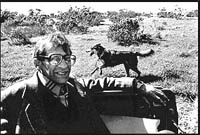

Otherminds II Participants 1993
Ashot Zohrabian
Interview with Charles AMIRKHANIAN pt 2 |
SHIMODA Nobuhisa | |||||||
 |
 |
Otherminds II Participants 1993 |
Ashot Zohrabian |
| Djerassi Program | Amirkhanian: There have been many Japanese artists in the last few years. We had HATAKEYAMA Naoya, a photographer and YOSHIHARA Yukihiro came. He was a wonderful resident. He made a very important one-hour video on our program. It's a document of a composer from Armenia, who stayed in the room next to Yoshihara's. And that man is Ashot ZOHRABIAN. He speaks no Japanese and no English. They can't speak to each other. The video camera follows him everywhere; it's very funny. A lot of strange things happened because we have cows on the ranch; we have animals everywhere. And he wrote something for the Kronos Quartet which they played at the festival. Kronos plays something every year for us. Shimoda: I am a little confused. There seems to be a complicated relationship between "Other Minds," the Djerassi Program and "Composer to Composer." Amirkhanian: OK. "Composer to Composer" was a festival in Colorado, which no longer exists. We did that for four years. After that I left KPFA Radio and I took the job with the Djerassi Program as an executive director. When I did that, I began another festival called "Other Minds." Shimoda: What about the Djerassi Program? Amirkhanian: It's a co-sponsor. Shimoda: Maybe the "Other Minds" festival was born out of it? Amirkhanian: No, not really. The Other Minds was originally a non-profit organization in San Francisco, but it had a different name and they changed their name to Other Minds. And then we started the festival. They provide the financing and they raise the money. The Djerassi Program only provides the place for four days, but no money. So the money to pay the composers is from the Other Minds ,Inc. So it is complicated, yes. Shimoda: The composers and photographers, and other artists stay at Djerassi for four days and after that what do they do? Amirkhanian: After that, they go to a hotel in San Francisco and they stay there. They give four nights of concerts there. Shimoda: The name of those concerts is also "Other Minds"? Amirkhanian: Yes, it's the "Other Minds Festival." To the public, it's known as the Other Minds Festival, and most people don't know much about the thing at the ranch. Shimoda: So a lot of people probably think Other Minds is the name of the festival. Amirkhanian: Right. They don't know about the organization. But the Other Minds,Inc. also does other events once or twice a year. For example, if LIGET I comes through town, we will organize a lecture or if somebody else famous comes, we can set something up with them. | |
At the Ranch |
Shimoda: What do the composers who participate in the program think about it? Amirkhanian: We have older and younger composers, we have black composers, Asian composers and Latin composers, and also white Americans and Europeans. The variety stimulates people. And I remember when we invited Rex LAWSON to come. He lives in London, and owns about 5,000 player piano rolls. He brought all of his rolls or many of them. Every night Muhal Richard ABRAMS, Terry RILEY, and Alvin SINGLETON, and other people would go into the piano room at the ranch. And all night they played rolls and listened. Shimoda: All night!? Amirkhanian: Well, almost. This is something unusual and people remember that. They have a good experience, and also being together on a ranch is a wonderful thing. Because it's so beautiful there. But we do make a point to have women composers, people from other cultures, people from all ages meeting together, so that the older people can help the younger people. Another thing that was interesting. When we had the first festival, Philip GLASS spoke to Jon JANG, who is a pianist from San Francisco. And he said "How do you make a living?" And Jon said, "Well, I only go up and they pay me a lot of money." Philip said "No, no, no. You have to go everywhere when you are young and do everything, and you can get money later." He was advising all these younger people how to make a living from music. So this is what happens when you have older and younger people together. I think it's very smart not to have everybody who agrees on everything all together. Like all minimalists or all twelve-tone composers, because if you have that then it increases competition. But if you have only one twelve-tone composer and one minimalist and one electronic and one African composer, they each have expertise in their area, and they can share that with people. But it's important also to invite people who will benefit from this and who will not be angry with the variety. Shimoda: Well, can they apply or do you choose them? Amirkhanian: I choose them. So when I'm traveling, I'm always looking for people to bring. I hope to have some Japanese composers coming in the next two or three years also. Because we haven't done enough yet with Japan. Shimoda: That should be interesting. Well, thank you very much for giving us so much interesting information. |